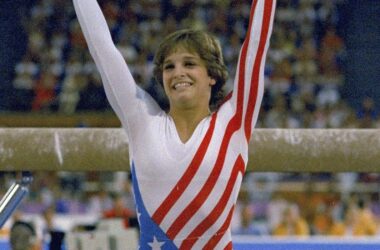Within the 2021 Summer time Olympics, all eyes had been on Simone Biles as she led the U.S. gymnastics group on its quest for the gold.
Broadly often known as the nation’s greatest gymnast, she was anticipated to outperform her earlier award-winning routines in Tokyo. However after her thoughts stalled throughout a serious vault, she dropped out of the group finals, citing the necessity to protect her psychological well being.
It was a second that shocked America as a result of few athletes had ever pulled out of a serious competitors for psychological well being causes — the norm had all the time been psychological toughness.
Sports activities have lengthy served as a metaphor for all times and athletes because the avatars for the virtues of competitors — sportsmanship, teamwork, grit. However the idea of psychological toughness — bearing down on one’s efficiency within the face of adversity — has been eclipsed by a give attention to psychological well being.
“We strive to not use ‘psychological toughness’ anymore as a result of it usually implies not feeling issues and simply pushing apart feelings to carry out,” stated Trent Petrie, a psychology professor and director of the Middle for Sports activities Psychology and Athlete Psychological Well being on the College of North Texas. “Psychological well being is about participating with others efficiently, having excessive emotional self-awareness and having the ability to depend on and join with folks.”
Mr. Petrie, who performed Division I volleyball at Ohio State, stated his middle has offered psychotherapy to tens of 1000’s of athletes from excessive faculties and universities to the WNBA’s Dallas Wings over the previous 20 years.
He famous in an interview that society’s “shifting norms” have elevated the emotional fragility of youthful athletes who spend extra hours utilizing social media, get much less sleep and obsess over setbacks with better depth than earlier generations.
Different psychologists, therapists and developmental well being consultants interviewed by The Washington Occasions agreed, including that the development goes effectively past sports activities.
Not toughing it out
Earlier than the digital revolution, the thought of psychological toughness fired the creativeness of generations of athletes who embraced efficiency slogans corresponding to “dialed in,” “man up” and “stroll it off.”
New York Knicks middle Willis Reed hobbled onto the courtroom to win the 1970 NBA Finals on a torn leg muscle. Baltimore Orioles shortstop Cal Ripken Jr. set a report by taking part in in 2,632 consecutive MLB video games regardless of having again issues.
“He who shouldn’t be brave sufficient to take dangers will accomplish nothing in life,” stated Muhammad Ali, who absorbed as a lot punishment as he dished out in his prizefights.
However Ms. Biles stands on the forefront of a brand new era of athletes who disavow the admonition to “suck it up.”
“I say, put psychological well being first,” the gymnast stated when she briefly withdrew from competitors. “As a result of when you don’t, you then’re not going to get pleasure from your sport and also you’re not going to succeed as a lot as you wish to.”
Different champions who’ve taken psychological well being breaks in recent times embody Olympic gold medal swimmer Michael Phelps and golfer Matthew Wolff.
“My melancholy and my anxiousness isn’t going to only disappear,” Mr. Phelps advised Healthline in a Could 2022 interview about his struggles with suicidal ideas and 2016 retirement. “I’m by no means going to have the ability to snap my fingers and say ‘Go away. Go away me alone.’ It makes me. It is part of me. It’s all the time going to be part of me.”
In July 2021, Mr. Wolff stepped away from competitors for 2 months. He stated he struggled to get away from bed and feared he would “screw up in entrance of everybody,” after successful the Jack Nicklaus award because the nation’s high faculty golfer in 2019.
“Psychological well being is a very huge drawback,” Mr. Wolff stated after returning. “Any skilled athlete has to cope with much more stress and stress than most individuals and it simply type of bought to me.”
Psychologists say there’s a generational distinction between older adults who discovered emotional resilience via private conflicts and youthful adults weaned on video video games and social media.
Vince Callahan, a household psychologist and founding father of the Florida Institute of Neural Discovery, famous that younger folks have earned “participation trophies” because the early Nineteen Nineties.
“Once we say it’s OK to attain factors with none want to win, we flip our tradition into an unmotivated society of sofa potatoes with out the power to face up to challenges or the motivation to do something,” Mr. Callahan stated.
Developmental well being consultants say “psychological well being” works greatest as an excellent for parenting, teaching and coaching younger people who find themselves extra emotionally fragile than their dad and mom and grandparents had been at their age.
On the similar time, they warn that so-called helicopter dad and mom and unmotivated youngsters can use psychological well being buzzwords as an excuse to keep away from something disagreeable, thereby unintentionally crippling themselves emotionally.
“Utilizing psychological language and watching on-line meditation movies doesn’t imply we’re mentally wholesome,” stated Marcie Beigel, a former particular schooling instructor who serves as a psychological well being marketing consultant to New York Metropolis’s public faculties. “Children at the moment be taught they will keep away from something they don’t get pleasure from, like brushing their enamel, by speaking about their emotions.”
“We wish the short repair as a result of we’re not conditioned to do the onerous work,” she added.
Challenges of contemporary residing
At this time’s consultants tout a give attention to psychological well being as a treatment for the melancholy, anxiousness and suicide dangers which have soared amongst younger folks rising from the isolation of COVID-19 restrictions.
In line with a number of studies, digital display time amongst younger folks shot up throughout pandemic lockdowns of colleges and public social shops and has remained elevated since.
On Oct. 13, Gallup reported that U.S. youngsters spend a mean of 4.8 hours on social media each day, with older teenagers and ladies main the best way. The most well-liked apps are TikTok and YouTube.
Some households might be throwing away psychological toughness too simply as extra younger folks than ever isolate themselves digitally, therapists say.
Ray Guarendi, an Ohio-based household psychologist and parenting writer, stated the development of fogeys letting social media increase their youngsters has taken away “the problem of residing” that helped older generations overcome obstacles.
“There are nonetheless tons of mentally robust individuals who quietly make their marriages work and lift youngsters with requirements,” Mr. Guarendi stated. “However our social media heroes are extra self-indulgent, radically autonomous people who reject the morality and establishments that when guided our tradition.”
• Tomorrow: Is psychological toughness nonetheless useful?








